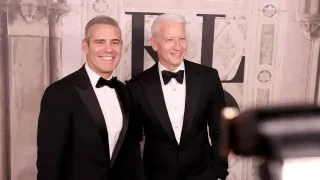October 29, 2020
Pics: Olympic-Winning Gymnast Danell Leyva Explains His Sexuality: 'It's an Ever-Changing Fluid Thing'
READ TIME: 3 MIN.
Olympic winner Danell Leyva explains why he came out as bi and pan. The Instagram-friendly gymnast writes, "It's an ever-changing fluid thing."
On October 11 – National Coming Out Day – two-time Olympic gymnast Danell Leyva shared a very personal tweet where he came out as pan and bisexual.
"I have known for a long time that I am not straight," he writes, admitting "I finally figured out that I'm bi and pan (I'm still trying to figure this out)..." He then explains "as of now at least, I'm not attracted to cis men," as well as expressing his emotional state: "As most of you can imagine, this is absolutely terrifying..."
This week in an interview with The Olympic Channel, Leyva "admits that coming out was made even more difficult by his stubbornness and determination – traits that helped lift him to the Olympic podium three times."
He explains that some of the biggest obstacles to his coming out are the stereotypes surrounding his sport.
Danell Leyva
"[The stereotypes were] such a big factor in it, just not giving those people the satisfaction of being right because it doesn't come from a good place. It wasn't somebody that was trying to help us understand [our sexuality]. It was just somebody pointing at us and that doesn't feel good," he told The Olympic Channel.
Initially, he thought of coming out last June, but George Floyd's death and the Black Lives Matter protests led him to reconsider. Then at the suggestion of his podcast producer, he decided to post on National Coming Out Day, adding that his coming out was a long time coming.
"I always knew. It was always just very rejected, internally rejected because of the way that we're all raised," he said. "And especially coming from a Hispanic family, it's very much rejected.
"As I was growing up, I would always somewhat reject [my sexuality]. But then, the more I accepted myself... I started realizing more and more things," continued Leyva. "I started realizing how normal it is."
"The now 28-year-old, winner of an all-around bronze at London 2012 and parallel bars and horizontal bar silver at Rio 2016, is no stranger to speaking out," writes The Olympic Channel. "He's steadfastly stood by his female teammates through their very public reckoning with USA Gymnastics in the wake of revelations about Larry Nassar's sexual assault and has consistently gone out of his way to lift up and recognize their excellence."
Danell Leyva
But his coming out has been a process that has taken him some time and sessions in therapy, which he admits came with therapy that he calls "phenomenally helpful." He also hopes that sharing his story on social media will have some impact on those struggling with coming out.
"If I get help one person to be brave enough to live in their truth, then I feel like that that was the entire point of that post," Leyva said.
"I hope to one day live in a world where your sexuality is as irrelevant as whether or not you're right or left-handed. You know, it's such a non-issue. It literally means nothing that if you're just like, 'Oh, you're left-handed? That's cool. Oh, you're bi? That's cool.' Like, it's really nothing," said Leyva. "The only way we can achieve that is by making it normal, by doing things like what I did by coming out publicly, by talking about it publicly, by just helping people understand."
And admits to being stunned by the positive response he received.
"I didn't think it was gonna blow up the way it did," said Leyva, who mentioned he'd heard from Olympic champions Aly Raisman, Simone Biles and Laurie Hernandez. The responses were not only positive, but they were also comforting, Leyva told The Olympic Channel.
"In the post, I said that I'm still trying to figure out between whether I'm bi or pan. It was nice to have people be like, 'You don't have to label it. You don't have to just be 'a thing'. It's an ever-changing fluid thing, so you don't have to worry about that,'" the 2011 World parallel bars champion explained. "That was nice because that was certainly reassuring."
Check out these pics from Leyva's Instagram:






